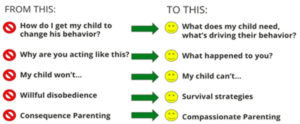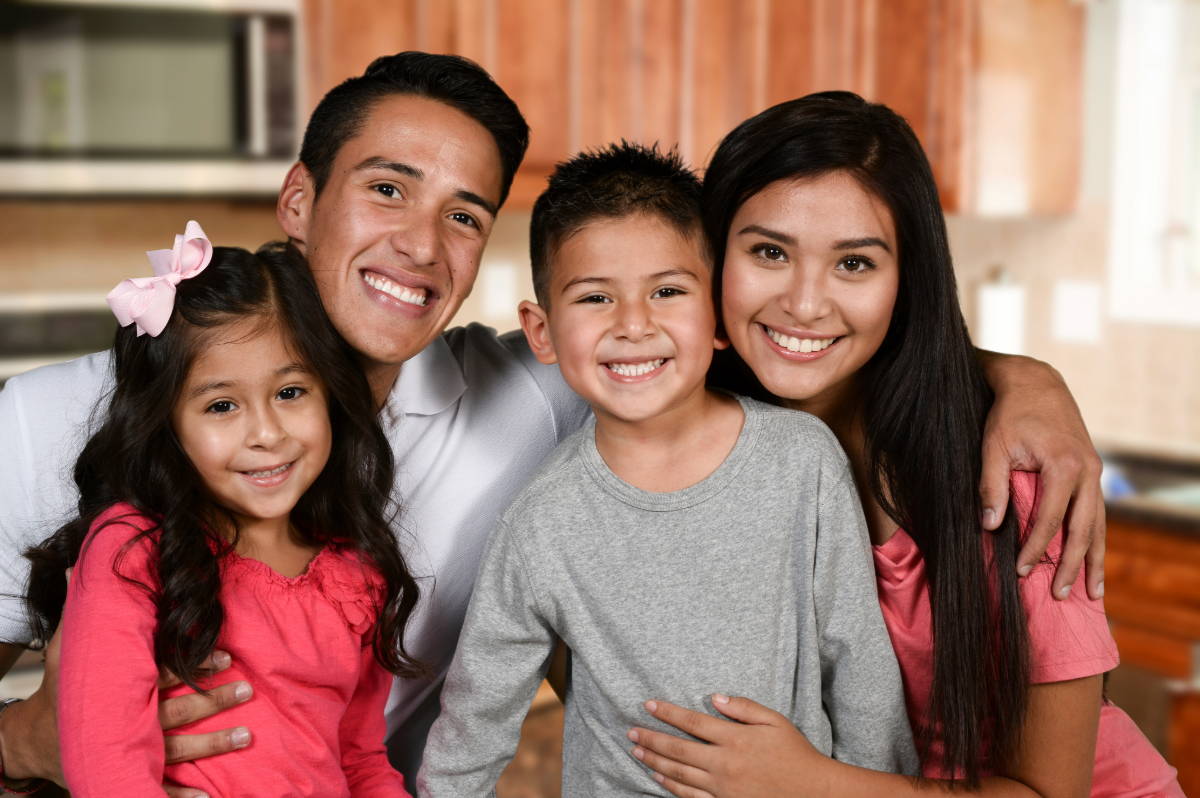Willful Disobedience to Survival Behavior
It can be challenging to shift the way we think about our child’s behavior. It can be so counterintuitive to see anger as a fear response or stealing as survival behavior. However, if we want to learn how to respond to our child’s challenging behaviors rather than react to their challenging behaviors, we have to change our perspective.
We cannot necessarily change their behavior. Ultimately, all we truly have control over is our own thoughts, feelings, and actions. Which means if we don’t like the way things are going down in our household, then we need to change something – and that something is us! We think we need to change our kids, but really we need to change ourselves.
First Things First
What does that kind of change look like? The first thing I need to do is change the way I view challenging behavior. If I want to respond in a trauma-wise way, then I need to train my mind to see behavior from a trauma-informed perspective. Changing the way I think will change the way I feel and respond.
Our Thoughts Lead To Our Actions
When my child acts out, I need to start paying attention to my thoughts regarding their behavior. Do I think things such as:
How dare they lie to me!
They are so disrespectful!
I hate when they shut me out!
I don’t like my child!
They are so ungrateful!
I feel so rejected.
If you find yourself thinking these thoughts, then you may need to tweak your mindset. All of these statements will only lead to disappointment as a parent. Due to the way you are thinking (AKA translating) their behavior, what are you making it mean?
For example, your child is mad and goes upstairs and slams their bedroom door shut. What do you think about that? Do you think it’s wrong for them to slam the door? I’m not saying if it’s right or wrong to slam a door. I simply want you to observe your thoughts about slamming the door.
This is an important step to change because how you think about a situation will dictate how you respond. Most of us don’t intentionally question our thoughts. We just have them. Being curious about what you’re thinking is the first step toward change.
Reaction vs Intentional Response
Say you think it’s wrong for your child to slam their bedroom door. Perhaps you’ve even talked to them about it before and told them they aren’t allowed to slam the doors. Nevertheless, Joey gets mad, runs to his room, and slams the door.
Immediately, you storm into the room and say, “I told you never to slam the door! I told you if you ever slam the door again, I’m going to take it off the hinges and you won’t have a door to slam!” This leads down the pathway of continued arguing and frustration. You think: how dare they continue to disrespect me and the house rules. You may even punish or give consequences.
Now, oppositely, what if when Joey slammed the door, you didn’t think it was wrong. What if when they slammed the door, you simply thought: Oh, they slammed the door. He/she must be expressing their anger and frustration.
Maybe you even think: I bet it felt good for them to slam the door and express their emotions that way. It’s an improvement from throwing something. Because you don’t think it’s wrong, you are able to give them the space they need in the moment to feel their feelings and not react.
Later, at dinner time, you say something like, “When you were mad earlier, I noticed you slammed your bedroom door. Did that make you feel better?” Because you don’t necessarily have any judgement tied to the door slamming, you can be curious about it and bring it up without shaming them or attaching your meaning to it. If you did want to bring up reasons you don’t like doors slamming, you could talk about other solutions, but it first starts with you.
The way we think influences the way we feel and act. Can you see how understanding your own thoughts/views of behavior can either limit or free you to respond in a trauma-informed way. The key to responding vs reacting is to observe our thoughts and consider new ways to think about challenging behavior. We can create a new way of responding by creating a new way of thinking.
Here’s a list of new ways to think about challenging behavior:

Choice and Voice
Perhaps you are having a hard time coming up with a new way to think about their behavior. A helpful way to develop a new thought is to start by contemplating how you would like to respond or feel. Would you like to respond in a more neutral way and not feel as angry and resentful?
What thoughts could you have that would lead you to feel more neutral and less angry/frustrated/resentful (insert your feeling here)? We can intentionally choose the thoughts we want to have. We have a choice in the way we think.
Our first thoughts may be unintentional, possibly even unconscious, but we can purposefully become mindful of our thoughts and change them. We can have and believe any thought we want. It’s our choice. It’s hard work but we can do it!
Recently, I came up with a new thought. I realized that when my son got really angry, I would have the thought: I’m trapped with a person I don’t like right now. This thought didn’t serve me well. My anger would begin to bubble up and I would say to myself, “Don’t react, don’t react. Just keep your mouth closed.”
I would start a whole internal dialog with myself based on these thoughts that would spiral down and I would feel trapped. I decided to do some “thought work” and become curious to what I actually was thinking at these times. Once I figured out this thought wasn’t serving me well, I took some time to ponder what a new thought could be.
I wanted a more neutral thought that I could believe. I couldn’t just make up a thought that was too hard to believe in the heat of the moment. This is about actually changing, not pretending to be something I’m not. It’s about believing new thoughts, changing our mindset – not white-knuckling it and trying to just think positively.
My new thought: I’m parenting a child who is upset.
Not too exciting or earth-shattering, is it? But this simple, neutral thought helps me feel and respond differently. I’m no longer thinking I’m trapped. Instead, I’m simply acknowledging in my head that my son is upset. That’s it.
I don’t need to attach anything else to it. This simple thought variance allows me to respond in a different way. Perhaps in the future, I can choose a new thought. One that allows me to respond to his heated moments with words of compassion. This is a journey, it’s about progress. There’s no such thing as a perfect parent, only a growing one.
Action Step
Have you stopped to consider your thoughts regarding your child’s behavior? What thoughts do you notice you have about your child’s challenging behavior that you would like to change? What is one new thought you could choose to think?
The Bible is very specific about uncontrolled anger. Proverbs 29:22 says, “An angry person causes trouble; a person with a quick temper sins a lot” (NCV). In Proverbs 15:18, you read, “Hot tempers cause arguments” (GNT). And Proverbs 14:29 says, “A hot temper shows great foolishness” (NLT).
Author
-

Tristen married her husband Max in 2000. They have 2 kids (plus 2 dogs), so she understands the complexities of life and the importance of strong relationships. Tristen is a certified Trust Based Relational Intervention (TBRI®) Practitioner, a loving adoptive mom, and a dedicated foster/adoptive parent trainer. Her extensive experience has allowed her to guide vulnerable families towards a path of hope and healing, nurturing bonds that truly matter. Her advocacy for children with early childhood trauma backgrounds has driven her to pursue a Master of Education in Trauma and Neuroscience, deepening her knowledge to make an even greater impact. In addition to her professional accomplishments, Tristen is an adoptive mom who wears multiple hats. She's a Trust Based Relational Intervention Practitioner and a Foster Kinship Continuing Education Trainer, dedicating over a decade to developing curriculum and advocating for foster and adopted kids. What sets her apart is that she lives and breathes the unique challenges that foster and adoptive families face every day. Her unwavering passion lies in helping these families discover hope and healing on their journey of raising children with relational trauma backgrounds.
View all posts






